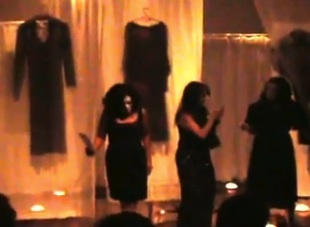The Black Dress
Vernita N’Cognita offered a cool and subtle performance last week, The Black Dress, at Soho20, on 27th St., a few floors down from Viridian Artists, where she presides as director. It was a departure for her, the work of a troupe, rather than a solo act, following on her successful partnership with another artist in Germany this summer for Trail of Sighs and Whispers. This time it was a simple and beautiful meditation on what is less an article of clothing and more a sort of sartorial best friend: the little black dress. (Guys have got the black t-shirt, so we kind of understand, but it isn’t the same.) The black dress is the ultimate way to both disguise and reveal the female form, something that gets called upon as a woman’s go-to apparel for a variety of situations, great and small, from cocktail parties to funerals. N’Cognita teamed up with DeeDee Maguire, Veronica Pena, Amanda Flowers, and Tania Sen for a performance backed by music from Charles Ditto—with a perfect, impromptu and accidental bit of Mona Lisa from Nat King Cole, rising up at the finish from some enthused attendee’s iTunes playlist. It was an inspiring touch. Why clap when you can summon Nat King Cole’s approval even more effectively?
“It wasn’t planned, but it was perfect,” she told me.
What struck me most was the elegance and beauty of her installation, which had its own coherence and integrity, a centerpiece for Soho20’s other exhibits, even when no one was performing. White masks dotted a low mountain of black fabric on the floor, the dresses still ready for action, hanging at attention, hovering in the air. They were hung behind sheer fabric, attached to curtain rods, a bit like Roman banners suspended from the ceiling. The women moved in slow-motion, each absorbed in her own dream world, in N’Cognita’s typical Butoh fashion, through what could have been the stations of personal life, with the spectral black dresses dangling overhead.
When I showed up to help take down the current show at Viridian Saturday, I asked her about the performance. She said that, as she was thinking about what to do, she found herself in her wardrobe and realized she’d collected about thirty black dresses over the years. (Imelda Marcos is turning over in her grave. Dresses, not shoes, Dragon Lady. Relax.)
“Every woman has one, if only for funerals or a special dress for cocktail parties, the theater, special meetings. I’m Eastern European. My grandmother, when she was older, always wore black. She was a widow and widows wore black then. That was the impetus for my performance. The group represented women of different nationalities, different ages, from their forties into their sixties. I had someone in her seventies, but she dropped out. My blond dropped out too.”
The performers emerged at the start dressed in robes with slips underneath, whispering, coming through a red curtain to move between and around the dresses, a bit like sleepwalkers. They spoke words Vernita had written, quotes from Wikipedia, dreams she’d incorporated into the script, with a recorded narration playing behind it all. All of it was simply a preparation, a stage, for the act of getting dressed: summoning the magic of that particular dress, each performer in her own unique way.
“It was feminist, but it was more about a kind of essence of womanly-ness. All we did was get dressed. We picked a dress out from the pile on the floor and sometimes we kind of fought over them. I had one woman from Spain in the performance. She’s going to see about having it staged in Spain. All of the woman in the show were artists, but only two had actually done performances before. We all met at the Half-King afterward, nearly 20 people, for drinks and conversation.”
And, in the empty gallery, once everyone had gone, the dresses remained behind, hovering under the ceiling, ready to be worn again.

Vernita it was nice hearing from you. The article is so interesting because my presentations deals with four topics: Love, forgiveness, Conquering Fear and Closure. The “Black Dress” is the center of my topic in “Conquering Fear.” In any case it is nice hearing from you and hope soon we could meet. Also, if you get a chance please see the Academy Award Documentary which was nominated this year titled “God is the Bigger Elvis.” I wrote part of the Documentary and also I was in it.”
Robert Trifiletti
Robert, love the HBO documentary. Great job, and a remarkable story.